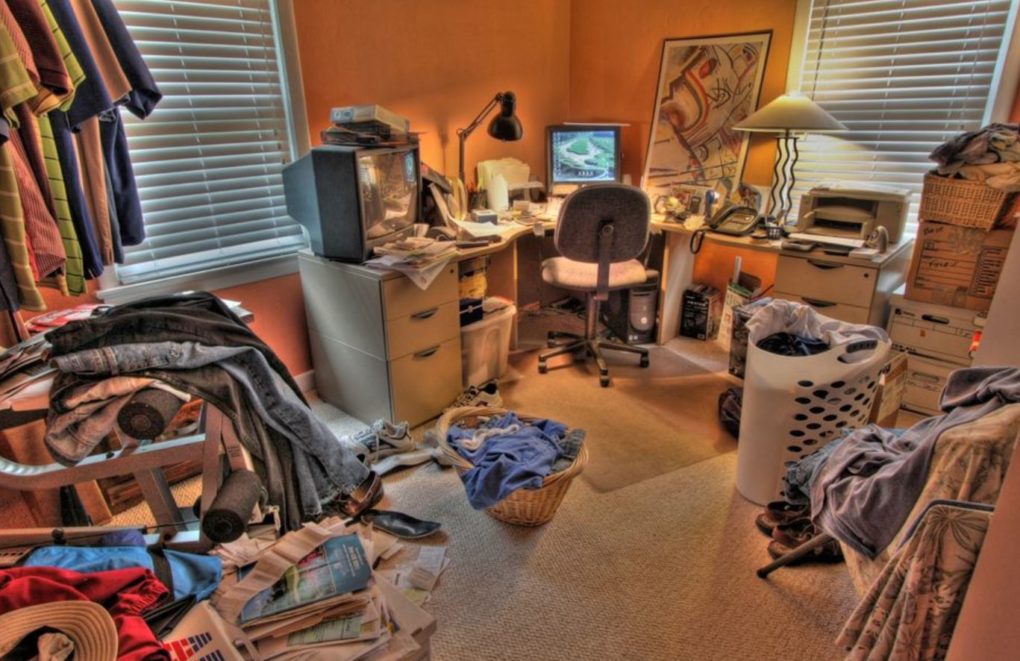There Is Good Evidence That Clutter Causes Anxiety & Stress
 By Richard Enos
By Richard Enos
- The Facts: Psychologist Sherrie Bourg Carter shares 8 reasons that stress may ensue from a cluttered environment.
- Reflect On: How clean is your environment? Have you tried de-cluttering to see if it makes a difference in how you feel?
Clutter in our home or office certainly does cause stress, according to an article in Psychology Today. Psychologist Sherrie Bourg Carter lists the following 8 reasons that stress may ensue from a cluttered environment:
- Clutter bombards our minds with excessive stimuli (visual, olfactory, tactile), causing our senses to work overtime on stimuli that aren’t necessary or important.
- Clutter distracts us by drawing our attention away from what our focus should be on.
- Clutter makes it more difficult to relax, both physically and mentally.
- Clutter constantly signals to our brains that our work is never done.
- Clutter makes us anxious because we’re never sure what it’s going to take to get through to the bottom of the pile.
- Clutter creates feelings of guilt (“I should be more organized”) and embarrassment, especially when others unexpectedly drop by our homes or work spaces.
- Clutter inhibits creativity and productivity by invading the open spaces that allow most people to think, brainstorm, and problem solve.
- Clutter frustrates us by preventing us from locating what we need quickly (e.g. files and paperwork lost in the “pile” or keys swallowed up by the clutter).
[do_widget id=text-48]
She also offers 8 remedies in the same article which are quite reasonable and practical. But before you rush over there to see what they are, there is something I’d like you to consider.
Mind Over Clutter
Consider whether an anxious mind is the result of clutter, or if clutter is actually the result of an anxious—one could say cluttered— mind. It’s great to get tips on how to eliminate clutter in our environment, but if our mind is ‘cluttered’ to begin with, and we don’t directly address this, we will probably not put the advice we’ve been given into practice, or may do some de-cluttering in a spurt only to revert back to our old habits.
It’s true that cleaning up clutter in our environment will likely help to ease our stress momentarily; but in the long run, the pattern of sucking up the energy to de-clutter only when the stress of clutter has become unbearable means that we will perpetually live cluttering and de-cluttering, rather than creating far less clutter to begin with.
Mindfulness
If you were to step back like a fly on the wall and see yourself in the process of actually creating all the clutter you live with, much of it would be predicated on having too many things on your mind, moving onto a second activity before finishing the first, allowing yourself to get distracted and untracked by external events. Negative thoughts or feelings are often present.
The practice of mindfulness then becomes our first priority. We need to be fully at peace in the moment and let go of any judgments about it.
- If you see the clutter as ‘wrong,’ as something you urgently have to ‘fix’, don’t act. Take a moment to accept it as it is.
- If you feel bad about yourself because there is clutter, don’t act. Take the time to accept yourself, and let go of whatever guilt, shame, or embarrassment you feel.
- If you think you can’t feel good until you clean up the clutter, think again. Get yourself out of the addictive pattern of blame and judgment as a motivator to do work.
At first, it might take some time in a quiet space to empty your mind of the judgments and negative feelings. As you get used to this process, it may only take a few deep breaths to re-orient yourself. You will know you are there when the process flows, and is even enjoyable. If it is not enjoyable, stop—and reach for mindfulness.
When we look at clutter this way, we are less likely to be impacted by the list of stressors described above—and far more motivated and inclined to deal with the clutter efficiently. Eventually, mindfulness will serve to mitigate much of the creation of the clutter to begin with. This is because we naturally create order in our physical world as a reflection of the order in our minds.
Article source: Collective Evolution
Richard Enos — My Master’s thesis on “The Anatomy of Self-Overcoming in Nietzsche” was only the beginning of my journey of exploration into consciousness. I have since lived and taught in Korea, studied yoga in India, written a book entitled “Parables for the New Conversation”, built a film and theater production company (pandorasboxoffice.ca), and started a family. While I endeavor to foster positive change in the world through my works, I hold fast to CE’s maxim ‘Change starts within’. I am humbled and grateful to have joined the CE team as of April 2018 as a contributing writer. You can reach me at richard@collective-evolution.com
Subscribe for natural health news to your inbox. Follow Natural Blaze on YouTube, Twitter and Facebook.


